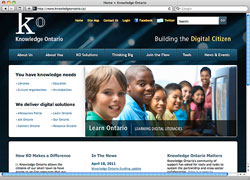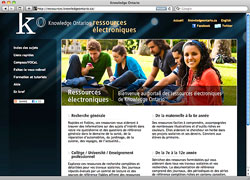Knowledge Ontario is providing unprecedented access to the high-quality online information that teachers and students can really use.
by Lois Browne
Digital research just got a lot easier in Ontario
Too often, students conducting research for a school project may enter a few key words in Wikipedia or Google and then skim a sea of links with no way of fishing out what’s really relevant.
Today, through Knowledge Ontario (KO), they have unprecedented access to high-quality information from a large number of authoritative, specialized databases. KO - a nonprofit organization funded by the province with support from school boards - provides free access to Ontario’s digital resources and to the technical supports needed to use them effectively.
Working with a consortium of 2,000 university, college, school and public libraries plus government ministries, Knowledge Ontario has brought its resources online to provide equitable access for anyone with an Ontario IP address. Schools can link directly from their own web sites and customize resources for their students, and now, anyone can access these resources directly from the KO web site.

“Our aim is to ensure that students become familiar with all these resources and to create the tools and technical support they will need to use them,” says Louise Slobodian of Knowledge Ontario. “It’s a safe way to introduce younger students to online tools. And for all students it’s a good way to focus on applicable and appropriate materials.”
Safety isn’t the only concern that access to these resources can address. KO and its services provide the means for Ontario teachers to ensure that their students have the research and analytical skills they are expected to have when they enter postsecondary institutions or the workforce.
“It’s an absolutely fabulous resource. All the teacher librarians in our board and in the Catholic system are delighted with it,” says Lorna Bell, OCT, teacher-librarian at South Carleton High School in Ottawa.
Bell provides information for students on what databases are available plus instruction on how to formulate a search and expand search terminology and how to get the most out of social media links and a range of tools for managing information. “You have very good quality resources from general information to peer-reviewed journals, which are excellent, especially for the senior students.”
The most heavily used of four major services (see sidebar) is eresources.knowledgeontario.ca, which many schools allow students to access through links on the school web site. It consists of a collection of more than 50 academic and general-interest databases that provide full-text articles on a vast range of topics.
Range of resources
Here is a sampling of the wide range of resources available through the databases:
- Academic OneFile provides peer-reviewed, full-text articles from the world’s leading journals and reference sources.
- Expanded Academic ASAP makes available full-text magazine coverage in the areas of the social sciences, the humanities, science and technology, and general interest.
- The Military and Intelligence Database is a custom collection of over 400 journals covering all aspects of the past and current state of military affairs.
- Career Cruising is a fully bilingual set of tools that helps students plan their study and work future.
- The Environment Issues and Policy Collection includes perspectives from the scientific community and government policy-makers, as well as corporate interests.
- The Science Collection offers current information on the latest developments in every scientific field.
- The Chilton Auto Repair database includes decades of data and repair manuals for automobiles going back to 1940.
- The Culinary Arts Collection includes 250 major cooking and nutrition magazines as well as reference content - including thousands of searchable recipes, restaurant reviews and industry information.
A number of databases are specifically Canadian in content. Canada in Context, for example, offers full-text articles from magazines, academic journals, newspapers, primary-source documents and multimedia files, all from a Canadian perspective.

Canadian POV organizes information on 200 topics ranging from Aboriginal People and Health Care to Youth and Substance Abuse. Each topic provides links to full-text print coverage divided into Canadian and international sources. Teachers especially love it because every topic also has a section that includes an overview, a pro-and-con presentation and a guide to critical analysis.
Click on the Genetically Modified Food topic for a list of four articles - an overview from a Canadian perspective, an article arguing that GM foods should improve nutrition and increase the food supply, an article arguing that GM foods carry numerous risks and a guide to critical analysis that can help readers evaluate the information and positions. Mary Jo Koch, Library Supervisor with Northern Collegiate Institute and Vocational School in Sarnia, who was formerly a public library reference librarian, knows the value of online resources. “It’s very expensive to house print reference materials, and we’ve had to cut back on magazine subscriptions.” With Knowledge Ontario, Koch can supplement her school’s small reference collection with completely up-to-date databases and resources - making quality reference materials affordable and available for everyone.
Postsecondary prep
Learning to use the databases properly also prepares students for university or college, where they will need to know how to do research that includes peer-reviewed journals. “Grade 12 students are told when doing their research that they must use academic journals,” notes Bell. “It’s often written into their assignments that they are required to use a certain number of peer-reviewed journals.”
Caeleb is a Grade 12 student at Riverdale Collegiate who finds the databases really useful. For her Introduction to Psychology, Sociology and Anthropology course, she needed very specific sources of information. “I was doing an assignment on homosexuality and nature versus nurture. Finding articles for that would have been impossible without the databases. I used Academic OneFile and was able to find what I needed.
“Novelist is another fantastic source.” she adds. “In Grade 12 we have to do a lot for novel study, and it’s easy to compare one novel to another, which is an integral part of our assignments.”
Tools that help
The databases also help with a range of special needs. They can be translated or may be available in other languages. Most of the articles have an option where you can listen to it being read.
“Ours is almost a rural school, but many of our students are ESL learners,” says Bell. “I tell them: ‘If you are reading something difficult, listen to the article being read at the same time you’re reading it.’ That really improves their English and their pronunciation.”
The audio feature also benefits students who are visually impaired.
Knowledge Ontario’s second most accessed service is Ask Ontario, which allows students to chat live online with a reference librarian. Slobodian says that the Ask Ontario librarian can help students formulate their research questions or find the right resources for an assignment.
Staff members bookmark reference material that lines up with the Ontario curriculum so they are prepared to help students according to their grade level.
Technical support is also available: Learn Ontario, which can be accessed through eresources.knowledgeontario.ca and through its own web site at www.learnontario.ca, provides online tutorials for hundreds of programs and software. It can help answer a range of questions: How do I make a pie chart? How do I blog? How can I put together a video for my class?
“You can believe that students are using this service,” says Slobodian.
All Learn Ontario tutorials have been vetted in order to provide the most effective tools for the purpose. “You don’t want 50,000 possibilities when you’re looking for help,” says Slobodian. “You want answers that will let you get your work done right away.”
Our Ontario - which is available via Knowledge Ontario as well as through its own site - lets teachers and students search the digital collections of libraries, archives, museums, historical societies, community groups and government agencies to discover Ontario’s culture and history, including its government, business and scientific heritage.
And services continue to expand. In January, seven new libraries were added to Ask Ontario, which is a collaboration of a number of public and university libraries. Our Ontario has just added a newspaper portal and already has a half-million newspaper pages for searching.
Four key online resources
Open to anyone with an Ontario IP address
Resource Ontario
eresources.knowledgeontario.ca
Ask Ontario
www.askon.ca
Learn Ontario
www.learnontario.ca
Our Ontario
www.ourontario.ca